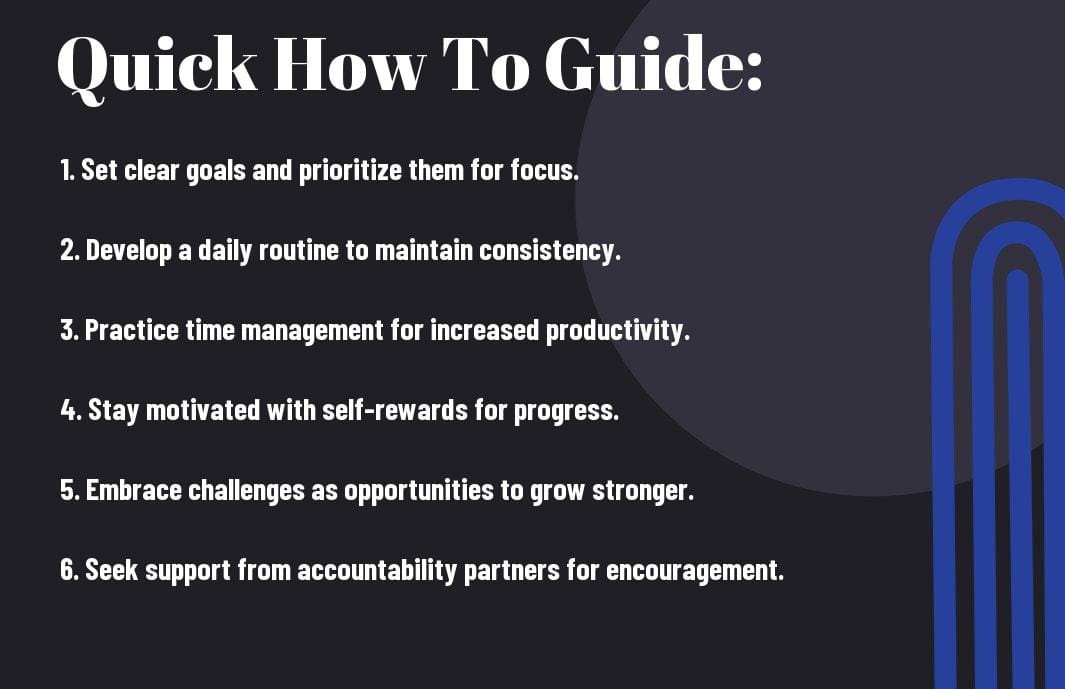You hold the key to unlocking personal and professional growth through the power of self-discipline. By harnessing this key skill, you can achieve greater success in all areas of your life. Self-discipline is not just about willpower, but also about creating daily habits and routines that lead to long-term fulfillment. In this comprehensive guide, we will explore effective strategies and techniques to help you master self-discipline and unleash your full potential.
Key Takeaways:
- Set Clear Goals: Define your objectives and create a detailed plan to achieve them. Having specific goals in place can provide you with direction and motivation.
- Establish Routines: Implementing daily routines can help you develop self-discipline by creating consistency in your actions. Stick to a schedule to build good habits over time.
- Practice Patience and Persistence: Self-discipline is a skill that requires practice and time to master. Be patient with yourself and stay persistent in your efforts to cultivate discipline both personally and professionally.

Laying the Foundation
Setting Clear Goals
On the journey to mastering self-discipline, setting clear goals is crucial. Goals help to provide direction, motivation, and a sense of purpose to your efforts. Make sure your goals are specific, measurable, achievable, relevant, and time-bound (SMART). By clearly defining what you want to achieve, you can create a roadmap to success and hold yourself accountable along the way.
Self-Assessment and Awareness
On the path to self-discipline, self-assessment and awareness play a vital role. Understanding your strengths, weaknesses, and habits is key to making meaningful changes in your life. Take the time to reflect on your behaviors, triggers, and patterns. Identify areas where you excel and where you need improvement. Being self-aware allows you to make informed decisions and take control of your actions.
Laying the foundation for self-discipline involves a deep explore your inner workings. By taking the time to assess yourself honestly, you can uncover areas for growth and development. Self-awareness allows you to recognize patterns that may be hindering your progress and empowers you to make positive changes.

Strategies for Enhancing Self-Discipline
How to Create a Discipline-Friendly Environment
Despite our best intentions, our environment can significantly impact our ability to maintain self-discipline. Creating a discipline-friendly environment is crucial for staying on track with your goals. Assuming you want to enhance self-discipline, start by decluttering your physical space, minimizing distractions, and setting up a dedicated work area free from interruptions. Surround yourself with positive influences that motivate and encourage you to stay disciplined.
Tips for Building Habits that Foster Discipline
Now, to build habits that foster discipline, start by identifying key habits that you want to cultivate. Begin with small, achievable goals and gradually increase the difficulty as you progress. Consistency is key in forming lasting habits that support self-discipline. Building a solid routine and sticking to it will reinforce your discipline over time. After all, habits are the building blocks of a disciplined lifestyle.
- Identify key habits
- Start with small goals
- Consistency is crucial
- Build a solid routine
Overcoming Obstacles
Identifying and Tackling Procrastination
Now, one of the key obstacles to self-discipline is procrastination. It is necessary to identify the root causes of procrastination, whether it be fear of failure, lack of motivation, or feeling overwhelmed. Once you understand why you are procrastinating, you can develop strategies to tackle it head-on. Break tasks into smaller, manageable steps, set deadlines, and eliminate distractions to stay focused and productive.
Coping with Setbacks and Maintaining Motivation
Now, setbacks are inevitable on the journey to mastering self-discipline. Any setback, whether it’s a missed deadline, a failed project, or a lapse in willpower, can derail your progress. It is crucial to develop resilience and a positive mindset to overcome setbacks. Learn from your mistakes, adapt your strategies, and stay committed to your goals. Remember your why and reignite your motivation to keep moving forward.
For instance, view setbacks as learning opportunities rather than failures. Use setbacks to identify areas for improvement and adjust your approach accordingly. Embrace setbacks as a natural part of the learning process and stay determined to achieve your long-term goals despite temporary obstacles.
Maintaining Self-Discipline
Monitoring Progress and Adapting Strategies
Many individuals struggle with maintaining self-discipline because they fail to monitor their progress and adapt their strategies accordingly. The key to staying on track is to regularly evaluate your goals and the action steps you are taking to achieve them. By tracking your progress, you can identify areas where you may be falling short and make the necessary adjustments to stay disciplined.
How to Stay Disciplined When Motivation Fades
The biggest challenge in maintaining self-discipline is staying on course even when motivation wanes. Some effective strategies to combat this include creating a routine, setting up rewards for yourself, and visualizing your end goals. It’s vital to remember that motivation can be fleeting, but discipline is what keeps you going in the long run.
For instance, when faced with a lack of motivation, setting small, achievable goals can help you gain momentum and slowly build up your motivation. Additionally, finding an accountability partner or a support system can provide the extra push you need during tough times. Bear in mind, consistency is key in maintaining self-discipline, even when motivation is at its lowest.
Applying Self-Discipline for Success
Leveraging Self-Discipline in Personal Life
All great accomplishments start with self-discipline. In personal life, self-discipline is crucial for achieving your goals and living a fulfilling life. This means making consistent choices that align with your values and priorities, even when it’s challenging. By developing self-discipline in your personal life, you can improve your health, relationships, and overall well-being.
Strategies for Professional Advancement through Discipline
Self-discipline is the cornerstone of professional success. It involves setting clear goals, creating a plan of action, and sticking to it through hard work and perseverance. Strategies for professional advancement through discipline include time management, prioritization, continuous learning, and resilience. By cultivating self-discipline in your professional life, you can increase productivity, achieve career growth, and stand out as a valuable asset in the workplace.
Summing up
From above strategies, it is evident that mastering self-discipline is crucial for personal and professional growth. By setting clear goals, creating a routine, practicing mindfulness, staying motivated, and seeking accountability, one can cultivate the self-discipline needed to achieve success. Consistent practice and dedication are key to strengthening self-discipline over time. Recall, self-discipline is a skill that can be developed and honed, leading to increased productivity, better decision-making, and a more fulfilling life overall.
FAQ
Q: What is self-discipline?
A: Self-discipline is the ability to control your impulses, emotions, and behaviors in order to achieve personal and professional goals. It involves setting clear goals, staying focused, and overcoming distractions and obstacles.
Q: Why is self-discipline important for personal and professional growth?
A: Self-discipline is crucial for personal and professional growth because it allows you to establish good habits, make progress towards your goals, and achieve success. It helps you stay motivated, organized, and on track, even when faced with challenges or setbacks.
Q: How can I master self-discipline?
A: To master self-discipline, you can start by setting specific, achievable goals, creating a daily routine, and practicing time management. It’s important to stay consistent, stay accountable, and stay positive. Remember to reward yourself for small accomplishments along the way to maintain motivation and momentum.




